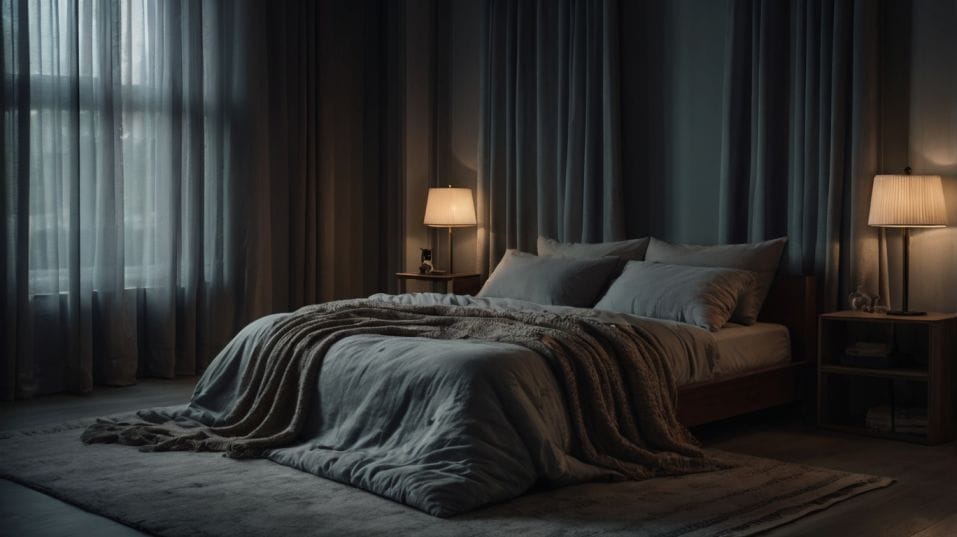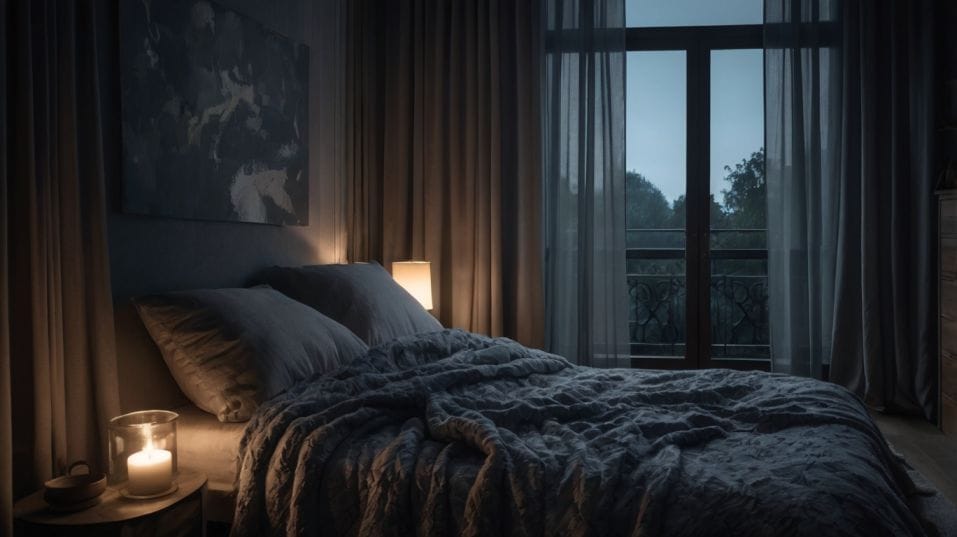The Science Behind Night Sweats and Sleep Disruption
Waking up drenched? Learn what causes night sweats and how to fix them—starting tonight—with science-backed, beginner-friendly sleep tips.

Ever wake up drenched and wondering what the hell went wrong with your sleep? You’re not alone—and no, it’s not just the room being too warm.
Night sweats are your body’s SOS, a signal that something deeper is off with your temperature regulation, hormones, or stress response.
If you’re serious about fixing your sleep, it starts with understanding the real science behind what’s waking you up—and how to finally put a stop to it.
What Night Sweats Really Mean for Your Sleep
Waking up soaked is more than just uncomfortable. It’s a sign that your sleep cycles are being disrupted at a critical point—usually during deep sleep (also called slow-wave sleep), when the body handles most of its physical recovery.
When your body senses overheating, it kicks into cooling mode, which pulls you out of that deep stage and back into lighter sleep or even full wakefulness.
That shift has a domino effect. You lose the restorative benefits of deep sleep—like muscle repair, tissue growth, and immune system support.
Your heart rate and blood pressure get thrown off. And when it happens repeatedly, you start waking up groggy, irritable, and drained—even if you technically spent 7+ hours in bed.
So what’s driving the overheating? A few key culprits—some obvious, some sneaky.

Body Temperature Isn’t a Constant
One of the most misunderstood things about sleep is that your body needs to cool down in order to fall asleep—and stay there.
This process starts about two hours before bed, when your core body temperature begins to drop naturally.
It’s controlled by your circadian rhythm (your internal body clock), which also governs melatonin production, metabolism, and alertness levels.
If your body can’t cool properly—because your room is too warm, your bedding traps heat, or your metabolism is ramped up from a late workout—you fight that natural drop. That can lead to overheating, stress activation, and, yes, sweating.
Your skin temperature and core temperature work in sync here.
If the environment around you stays warm or humid, your body keeps fighting to regulate itself, which ramps up sweat output. You may not even notice this struggle until it wakes you up.
How Your Sleep Setup Might Be Fueling the Problem
Most people make one of two mistakes: they either bundle up too much or keep their sleep space way too warm. The ideal sleep environment? Cool, dark, and breathable.
Here’s what that looks like in real life:
- Keep your bedroom temperature between 60–67°F (16–19°C).
- Use natural fabrics like cotton or bamboo for sheets and sleepwear. Synthetic materials trap heat and moisture.
- Switch to a lightweight, breathable comforter or even a cooling blanket if you’re a hot sleeper.
- Use a fan or open window to boost airflow if your HVAC isn’t cutting it.
Also, pay attention to mattress materials. Memory foam, while comfy, tends to retain heat. If you're waking up sweaty and sleep on one, consider a cooling mattress topper or switching to a more breathable material like latex.
The Hidden Influence of Hormones
Night sweats often get blamed on external temperature alone, but internal chemistry plays a massive role—especially when it comes to hormones.
Estrogen and progesterone affect how the hypothalamus (your brain’s thermostat) interprets body temperature.
Fluctuations—during menstruation, perimenopause, or hormone therapy—can confuse this signal, causing your body to overreact with heat and sweat.
This is why night sweats are so common in women around menopause, but it’s not just a female issue.
Testosterone also influences metabolic rate and body heat. Low levels in men—common with age or chronic stress—can disrupt sleep quality and thermoregulation.
And everyone, regardless of gender, deals with cortisol spikes when stress levels go unmanaged. Elevated cortisol at night raises your heart rate, increases body temp, and activates your sweat glands.
Want to keep hormones in sync with your sleep goals? Focus on blood sugar regulation, daily movement, and evening routines that signal “safety” to your nervous system. That leads straight to the next point.
Stress, Blood Sugar, and the Sympathetic Nervous System
You don’t need to feel “stressed” to have your nervous system stuck in overdrive.
If you’re constantly multitasking, rushing through dinner, or working late into the night, your sympathetic nervous system—the one responsible for fight-or-flight—never powers down.
That creates sleep-disruptive patterns:
- Elevated cortisol at bedtime
- Blood sugar crashes during the night
- Spikes in adrenaline that jolt you awake (often with a sweat response)
To fix it, build a wind-down window. Shut off work notifications. Dim the lights.
Do anything that lowers mental stimulation: stretching, light reading, calming music, or even a hot shower (which paradoxically cools you after by increasing peripheral blood flow).
And don’t overlook blood sugar. Eating refined carbs too close to bedtime can lead to a crash a few hours later, which activates the stress response.
Try a small protein-based snack an hour before bed if you tend to wake up between 2–4 a.m.—this is when cortisol naturally begins to rise, so even a minor imbalance can trigger sweat.
Real Fixes for Real-World Sleep
Let’s cut through the fluff. You want tools you can use tonight—not just theories.
Start with temperature: Cool your room, layer your bedding smartly, and use breathable sleepwear.
Check your habits: Cut caffeine by mid-afternoon. Avoid alcohol before bed (it fragments sleep and raises core temp).
Move earlier: Evening workouts are fine—but finish at least 2 hours before sleep so your body has time to cool.
Build wind-down rituals: You’re not a machine—your body needs cues that it’s safe to sleep. Create them.
Regulate light: Use blue-light blockers or shift to warm lighting after sunset to reinforce melatonin production.
Stay consistent: Going to bed and waking up at the same time—even on weekends—locks your body into a rhythm that supports better thermal regulation and hormone balance.
You don’t need to overhaul your entire lifestyle to beat night sweats. You just need to identify what’s throwing your system off and make intentional adjustments that align with your biology.
Final Thoughts
Night sweats aren’t random. They’re your body waving a flag—saying something’s off with your sleep setup, habits, or internal balance.
Fixing them isn’t about patching symptoms. It’s about creating an environment and routine that work with your natural rhythms, not against them.
Start now. Cool your bedroom. Upgrade your bedding. Cut the chaos before bed. You’ll sleep deeper, recover faster, and wake up feeling like someone who actually slept—because you did.




